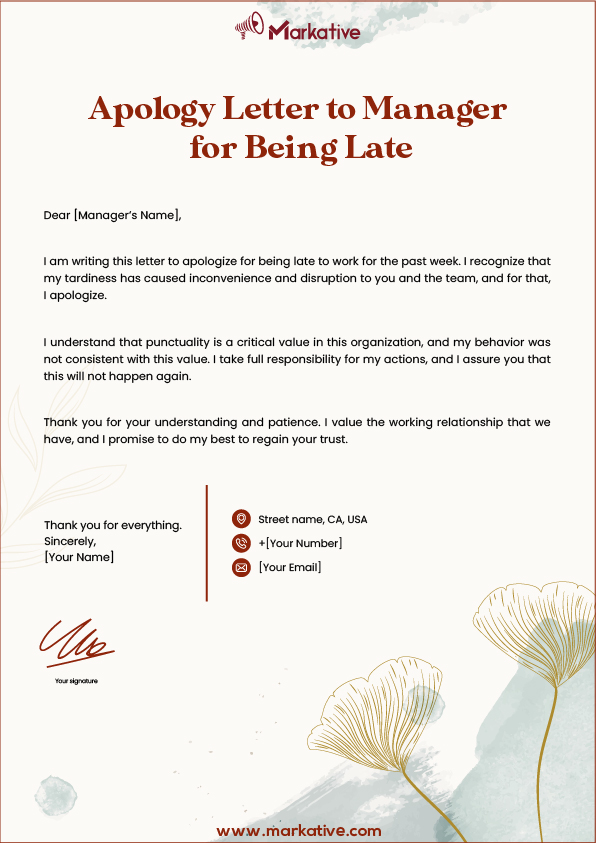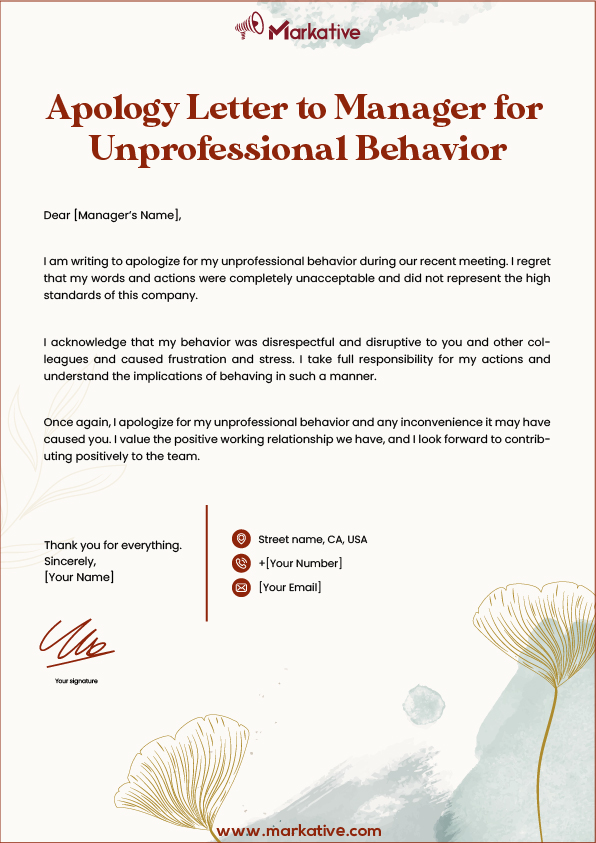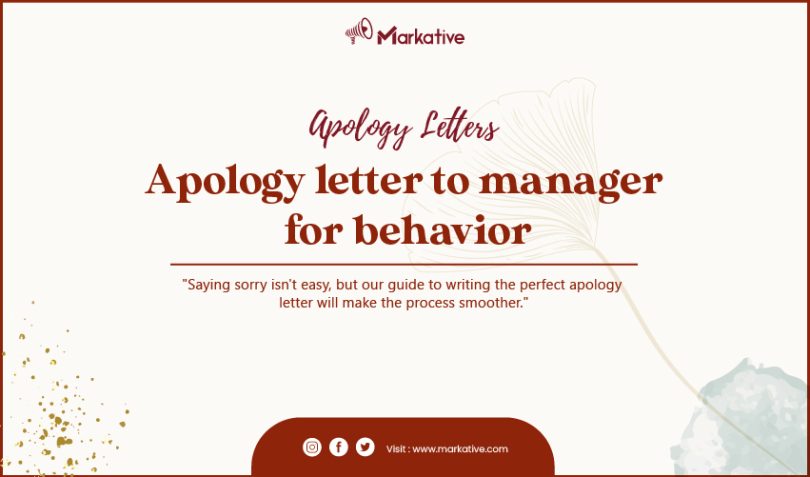Apologizing for unacceptable behavior in the workplace to your manager can be intimidating and challenging. It requires sincerity and humility in admitting your actions and seeking forgiveness. However, writing an apology letter to your manager can help you express your regret and remorse, and take responsibility for your behavior. In this article, we will discuss five samples of Apology Letter to Manager for Behavior and provide tips on how to write an apology letter that will help you resolve the conflict.
What is an Apology Letter to Manager for Behavior?
An apology letter to a manager for behavior is a formal letter written to apologize for any misconduct, unacceptable behavior, or inappropriate actions that an employee has made in the workplace. This type of letter addresses the identified behavior that the employee is taking responsibility for and expresses sincere regret for the harm caused to the manager, colleagues, or the organization. It aims to build bridges, restore trust, and reaffirm commitment to professional conduct.
For More: Write a Best Apology Letter to the Manager: Tips and 5 Samples
Tips on Writing an Apology Letter to Manager for Behavior
Writing an apology letter to your manager for behavior requires some careful considerations to ensure that you meet the necessary standards of professionalism and sincerity. Here are some tips to guide you.
- Start with a sincere apology: Begin the letter with a sincere and specific apology for the behavior that you are apologizing for. Your apology should be substantial, straightforward, and acknowledge that you understand the implications of your actions.
- Be honest and specific: Be specific about what you have done wrong and take full responsibility for your behavior. Avoid being defensive, blaming others, or making excuses for your actions.
- Express empathy: Put yourself in your manager’s position and try to understand how your behavior has impacted them. Express empathy, acknowledge their feelings, and show that you are willing to make amends.
- Explain what happened: Explain the situation that led to your behavior. Be concise, factual, and avoid exaggeration. This information can help your manager understand the context and make informed decisions about how to address the situation.
- Offer a solution: If possible or appropriate, offer a solution to help resolve the issue. This could include proposing a course of action to correct your mistake, a plan of improvement, or a commitment to better behavior in the future.
- Close your letter with gratitude: Thank your manager for their understanding, compassion, and patience, and express your commitment to a positive and professional working relationship.

Sample Apology Letters to Manager for Behavior
Here are five samples of apology letters to a manager for behavior. You can use as a guide when writing your own.
Apology Letter to Manager for Unprofessional Behavior
Dear [Manager’s Name], I am writing to apologize for my unprofessional behavior during our recent meeting. I regret that my words and actions were completely unacceptable and did not represent the high standards of this company. I acknowledge that my behavior was disrespectful and disruptive to you and other colleagues and caused frustration and stress. I take full responsibility for my actions and understand the implications of behaving in such a manner. I recognize that there is no excuse for my conduct, and I assure you that I will take steps to address this behavior and work on improving my communication skills and emotional intelligence. I regret the harm that I caused to you, and I hope that we can move forward with a renewed commitment to professionalism and mutual respect. Once again, I apologize for my unprofessional behavior and any inconvenience it may have caused you. I value the positive working relationship we have, and I look forward to contributing positively to the team. Sincerely, [Your Name]
For More: Best Apology Letter for Disrespectful Behavior with [7 Samples]
Apology Letter to Manager for Poor Attitude
Dear [Manager’s Name], I want to express my sincere apology for my poor attitude and unacceptable behavior towards you and the team. My attitude was disrespectful, unprofessional, and did not demonstrate the values of this company. I am aware that my negative attitude and behavior caused tension and conflict in the workplace, and I regret the harm that I caused to you and my colleagues. I take full responsibility for my actions and assure you that I will do my best to improve my attitude and work collaboratively with the team. I value the trust and confidence that you have placed in me, and I understand that it is my responsibility to demonstrate my commitment to professional conduct. I promise to take proactive steps to eliminate this behavior and contribute positively to the team and the organization. Thank you for your understanding and patience, and I hope that we can work together to move beyond this incident and achieve our goals. Best regards, [Your Name]
Apology Letter to Manager for Being Late
Dear [Manager’s Name], I am writing this letter to apologize for being late to work for the past week. I recognize that my tardiness has caused inconvenience and disruption to you and the team, and for that, I apologize. I understand that punctuality is a critical value in this organization, and my behavior was not consistent with this value. I take full responsibility for my actions, and I assure you that this will not happen again. I want you to know that I appreciate the importance of being on time, and I understand the impact that my lateness has on the team. Moving forward, I will make sure to arrive at work on time and honor my commitment to the team. Thank you for your understanding and patience. I value the working relationship that we have, and I promise to do my best to regain your trust. Sincerely, [Your Name]
For More: Best Apology Letter for Being Late to Office & 7 Samples
Apology Letter to Manager for Poor Performance
Dear [Manager’s Name], I am writing to apologize for my poor performance over the past few months. I recognize that I have not been meeting the expectations of my role, and for that, I am sorry. I understand that my lack of productivity has affected the team's performance and caused inconvenience and disappointment. I take full responsibility for my actions and assure you that I am committed to turning this situation around. As your employee, I am aware of the impact of my performance on the organization, and I will take deliberate steps to improve my work output. I will strive to be more proactive, efficient and deliver quality results. I value my role in this organization, and I am committed to making a positive impact on the team's success. Thank you for your understanding and support, and I hope to regain your confidence in my abilities. Sincerely, [Your Name]
Apology Letter to Manager for Conflict
Dear [Manager’s Name], I am writing to apologize for the conflict that occurred between us yesterday. My behavior was inappropriate, and I regret that it had to escalate to that level. I acknowledge that I behaved unprofessionally, and I take full responsibility for my actions. I realize that I allowed my emotions to override my judgment, and that is not acceptable in any work environment. I value the relationship that we have, and I am committed to finding a way to work through our differences respectfully. I would appreciate the opportunity to discuss the matter with you, and I am open to suggestions on how we can move forward. Once again, I apologize for my behavior, and I hope that we can resolve this conflict and continue to work together as a team. Sincerely, [Your Name]

Key Takeaway
Writing an apology letter to your manager for behavior requires preparation, introspection, and sincerity. It is an opportunity to take responsibility for your actions, express remorse, and seek forgiveness. Use the five samples as a guide to help you craft your apology letter.
Remember to be honest, specific, and empathic, and provide a solution to help resolve the situation. With an effective apology letter, you can restore trust, reestablish your commitment to professionalism, and move forward towards a positive working relationship.







